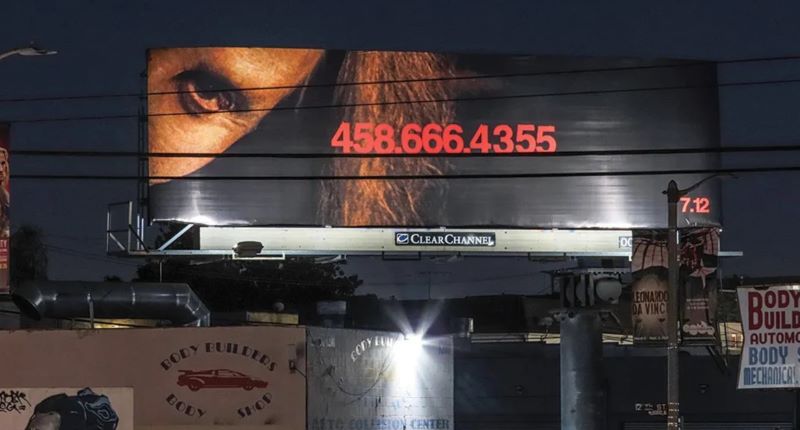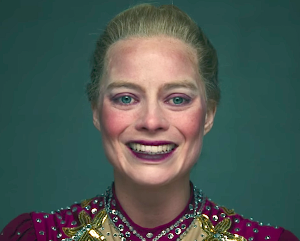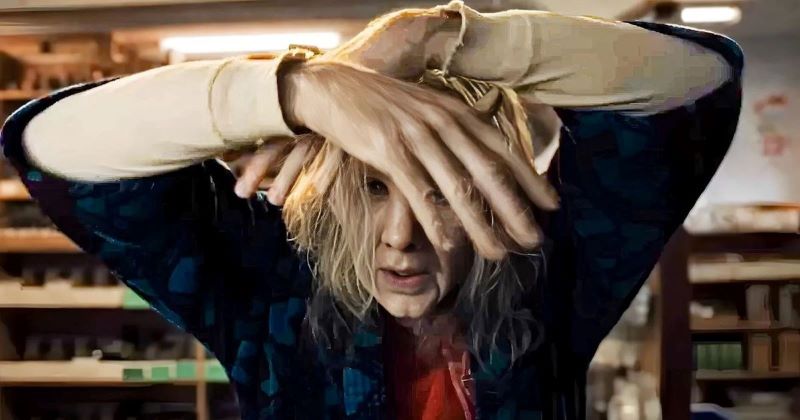Seven-year-old Neon emerged as a mainstay in the hardscrabble domestic theatrical distribution business, where most new entrants fail or shrink to irrelevancy within a few years.
Highlights of its short history include 2020 Oscar Best Picture winner “Parasite,” the Korean-language import; and also sassy ice skater drama “I, Tonya.” And this year, there’s the sleeper horror hit “Longlegs” (Nicolas Cage pictured above) and festival darling “Anora.”
Neon founder and CEO Tom Quinn embraces the eclectic from foreign language films to horror film like “Longlegs,” which has grossed $74 million domestically. “Great cinema is great cinema, regardless of whether it’s an action film or a documentary,” says Quinn in a Hollywood Reporter profile by Pamela McClintock.
Like most indies, Neon takes chances in marketing with big swings-for-the-fences using smallish quirky ploys. For example, four outdoor billboards for “Longlegs” in prime Los Angeles media neighborhoods didn’t display the movie title, but just a phone number framed by a provocative horror image. Neon says those four billboards generated 1.4 million calls to the displayed phone number from 68 countries (not sure why the international response).

The student newspaper at the University of Pennsylvania gave Neon a back-hand compliment for marketing excellence, saying “Longlegs” is a mediocore film. But its marketing is brilliant “for its understanding that true fear stems from the unseen,” wrote Fiona Herzog.
The Hollywood Reporter article suggests an intense competition focused on rival domestic-theatrical distributor A24, which is a peer in many ways. A24 sports an Oscar Best Picture too with “Everything Everywhere All at Once” for 2022. But Quinn downplays any notion of singular competitive focus though acknowledges the two distributors often bump heads, especially at film festival bidding battles for movies.
Neon employs 52 people (launched in 2017 with six staffers) and has released 114 films that won six Oscars and 32 nominations. In recent years, Neon consistently ranks in the teens among all domestic theatrical distributor (the major studios take the top five slots). That level and consistency makes Neon a mainstay of the rough-and-tumble independent film sector. Its offices are in New York and Los Angeles.

In 2022, news reports indicated that insiders considered selling Neon, but no transaction materialized. Around the same time, Neon pushed into international by setting up a foreign sales arm, which parcels out film rights to overseas distributors.
Neon endured controversy when filmmaker Ava DuVernay publicly fumed over marketing her film “Origin.” In the Hollywood Reporter article, Quinn said that Neon fulfilled all its obligations and praised the film.
Also, the rumor mill buzzed that its 2023 Michael Mann drama “Ferrari” could ruin Neon financially, which Quinn disputes. He says that Neon spent over $17 million on domestic advertising support for “Ferrari” that will be covered from revenue from all distribution windows, after paying $15 million to acquire domestic rights. In the first window, the drama about the famed Italian carmaker grossed a decent and on-target $18.5 million domestically from cinemas.
As for founder Quinn, he paid his indie-sector dues working at Samuel Goldwyn Company, Magnolia and Radius-TWC, a label of The Weinstein Co., before opening Neon in 2017. A founding investor is 30West, itself a fairly new entrant providing investment, production and sales in film from offices in Santa Monica.

Related content:

Leave a Reply